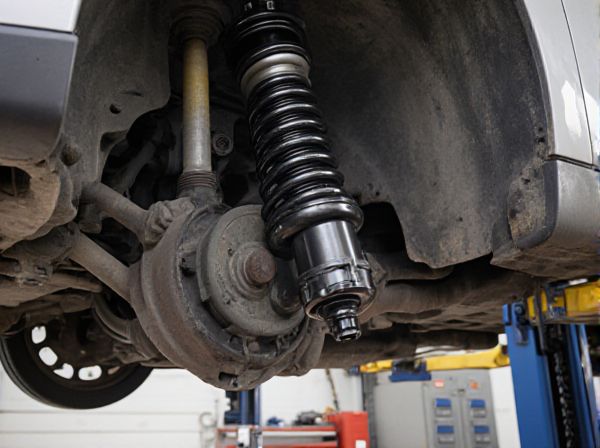
Photo illustration: Torsion Bar vs Coilover
Torsion bars provide a durable, space-saving suspension solution by using a steel bar that twists under load, offering consistent performance for off-road and heavy-duty applications. Coilovers combine a coil spring and shock absorber into a single unit, delivering precise handling and adjustable ride height for enhanced driving dynamics. Your choice depends on whether you prioritize simplicity and toughness or customization and performance.
Table of Comparison
| Feature | Torsion Bar Suspension | Coilover Suspension |
|---|---|---|
| Design | Steel bar that twists to provide spring action | Coiled steel spring around a shock absorber |
| Adjustability | Limited; pre-load can be adjusted by bar tension | Highly adjustable; ride height and damping settings customizable |
| Ride Comfort | Firm, may transmit road imperfections | Smoother ride, better shock absorption |
| Durability | Long-lasting, simple mechanism | Durable but more components subject to wear |
| Space Efficiency | Compact, fits well in tight suspensions | Bulkier, requires more installation space |
| Cost | Lower initial cost | Higher cost due to complex design and adjustability |
| Common Applications | Trucks, off-road vehicles, some SUVs | Performance cars, racing, custom suspensions |
Introduction to Suspension Systems
Torsion bar suspension systems utilize a metal bar that twists to absorb road shocks, offering adjustable ride height and durability suitable for heavy-duty applications. Coilover suspension combines a coil spring encircling a shock absorber, providing precise handling, ease of tuning, and improved ride comfort preferred in performance vehicles. Both systems play critical roles in vehicle dynamics by supporting weight, absorbing impacts, and maintaining tire contact with the road surface.
What is a Torsion Bar Suspension?
A torsion bar suspension uses a steel bar acting as a spring by twisting along its axis to absorb road shocks, providing a compact and adjustable suspension system. This system allows for precise ride height adjustments by altering the bar's torsion angle, making it ideal for vehicles requiring customizable load handling. Unlike coilovers that rely on coil springs, torsion bars offer durability and a simplified design with fewer components, often found in trucks and off-road vehicles.
How Coilover Suspension Works
Coilover suspension combines a shock absorber and a coil spring into a single, integrated unit, allowing precise adjustment of ride height and damping characteristics. The coil spring compresses and decompresses to absorb road shocks, while the shock absorber controls the spring's oscillations for improved handling and comfort. This design provides superior tuning flexibility compared to torsion bars, which use a twisting bar to resist suspension movement.
Key Differences: Torsion Bar vs Coilover
Torsion bars use a steel bar that twists to absorb suspension movement, offering adjustable ride height and durability, while coilovers combine a coil spring and shock absorber into a single unit for precise handling and ride quality. Coilovers provide greater customization with adjustable damping and spring rates, making them ideal for performance-oriented vehicles, whereas torsion bars are simpler, more compact, and often found in trucks and SUVs. The key difference lies in the ride tuning flexibility, with coilovers delivering superior adjustability compared to the relatively fixed setup of torsion bars.
Performance Comparison: Torsion Bar vs Coilover
Torsion bars offer consistent load-bearing capacity and compact design, providing reliable handling and ride height adjustment ideal for off-road and heavy-duty vehicles. Coilovers deliver superior performance through precise damping control and adjustable spring rates, enhancing cornering stability and responsiveness on both street and track applications. The choice between torsion bars and coilovers depends on desired suspension tuning, with coilovers typically favored for high-performance setups due to their adaptability and fine-tuning capabilities.
Ride Comfort and Handling
Torsion bars offer a more compact suspension solution that provides a firmer ride, enhancing handling precision on uneven terrains yet often resulting in a stiffer ride comfort compared to coilovers. Coilover systems deliver superior ride comfort by allowing adjustable damping and spring rates, optimizing both low-speed cushioning and high-speed stability for diverse driving conditions. The choice between torsion bar and coilover setups significantly influences vehicle dynamics, with coilovers favoring tunable handling balance and torsion bars emphasizing durability and consistent performance.
Adjustability and Customization Options
Torsion bars offer limited adjustability through preload settings that slightly alter ride height, making customization more straightforward but less precise. Coilovers provide extensive adjustability with adjustable spring rates, damping levels, and ride height, allowing for finely tuned suspension setups tailored to specific driving conditions. Enthusiasts and racers prefer coilovers for their superior customization options, enhancing performance and handling.
Maintenance and Durability
Torsion bars typically require less frequent maintenance due to their simple design and durable steel construction, making them highly resilient under heavy loads and rough conditions. Coilovers demand more regular upkeep, including inspecting and replacing shocks or springs to maintain optimal performance, though they offer superior adjustability for suspension tuning. Durability-wise, torsion bars are generally more robust for long-term use, while coilovers may wear faster but provide enhanced ride quality and customization options.
Cost Analysis: Torsion Bar vs Coilover
Torsion bars generally offer a lower initial cost compared to coilovers, making them a budget-friendly option for suspension upgrades. Maintenance expenses for coilovers tend to be higher due to adjustable components that may require frequent tuning or replacement. Over time, the total cost of ownership for coilovers increases, offsetting their performance benefits in comparison to durable, low-maintenance torsion bars.
Choosing the Right Suspension for Your Vehicle
Torsion bars offer adjustable ride height and a compact design, making them ideal for off-road vehicles and trucks seeking durability and space-saving suspension components. Coilovers provide superior handling and ride quality with adjustable damping and spring rates, preferred for performance cars and street tuners requiring precise tuning. Choosing the right suspension depends on your vehicle's usage, desired ride characteristics, and suspension space constraints to balance comfort, control, and adjustability.
 caratoz.com
caratoz.com